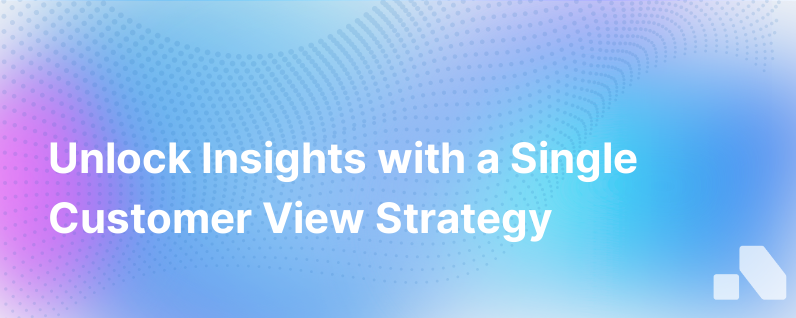
In the realm of customer relationship management, the pursuit of understanding the customer thoroughly has led businesses to seek out strategies that unify customer data into a cohesive, comprehensive view. A single customer view (SCV) is an aggregated, consistent, and holistic representation of the data known by an organization about its customers that can be viewed in one place. The concept is much more than a CRM buzzword. For those who have managed to achieve it, it's a strategic asset that can differentiate a company in a competitive marketplace.
Understanding Single Customer View
At its core, the SCV unifies customer data across various touchpoints and interactions with a company. It amalgamates demographic data, behavioral data, transactional data, and much more to create a 360-degree view of the customer. This integration enables businesses to treat their customers as individuals, tailoring their marketing efforts, communications, and product recommendations to fit the unique needs of each person.
The Benefits of a Single Customer View
The advantages of implementing a SCV are both widespread and significant:
- Enhanced Customer Experiences: By understanding customer interactions across different channels, companies can create seamless and personalized customer experiences.
- Improved Marketing Efficiency: With deep insights into customer behavior, businesses can target their marketing campaigns more effectively and improve conversion rates.
- Informed Decision Making: SCV provides a rich source of data that can be leveraged for strategic decisions across the organization.
- Increased Revenue Opportunities: An understanding of the full customer lifecycle opens up opportunities for upselling and cross-selling.
- Better Data Hygiene: As disparate data sources are consolidated, inconsistencies and duplicates are removed, improving the quality of the data.
- Compliance and Trust: Centralized data helps with adherence to privacy laws like GDPR, building trust with customers.
Overcoming the Challenges
Creating a SCV can be a daunting task, especially when dealing with legacy systems, data silos, and the pace of real-time customer interactions. Many companies face challenges in data integration, consistent data collection, data quality, and ongoing data management. However, by deploying modern data processing tools, adopting robust data governance policies, and a commitment to a customer-centric culture, these hurdles can be overcome.
How to Implement a Single Customer View
The journey toward a SCV involves several key steps:
Step 1: Data Collection
The first step is to identify and collect data from all customer touchpoints – website visits, social interactions, contact center notes, transaction history, and even offline interactions.
Step 2: Data Integration
The collected data must be integrated, which requires a powerful data management system capable of processing huge volumes and varieties of data. This system should clean, deduplicate, and harmonize data to create a single record for each customer.
Step 3: Data Analysis
Once you have a unified database, analytic tools can be applied to derive actionable insights that drive customer engagement and business growth.
Step 4: Privacy and Compliance
Implement strict data privacy measures complying with regulations like GDPR to ensure customer trust and legal compliance.
Step 5: Continuous Data Review and Update
Regularly review and update the customer data to maintain its accuracy and relevance, as data decays rapidly.
Step 6: Empower All Teams with Data Access
Ensure that everyone in the organization, from sales to customer service, has access to the SCV to create a consistent customer experience across all departments.
Step 7: Culture of Customer Centricity
Cultivate a culture focused on customer needs and experiences, a key component in leveraging SCV for improved customer relationships.
Real-World Examples of Single Customer View
Let's illustrate with a hypothetical scenario: Jane Doe has purchased from your e-commerce platform, engaged with customer service, and frequently reads your newsletters. Instead of seeing these as separate interactions, a SCV would provide a comprehensive picture of Jane’s engagement with your brand, enabling personalized interactions that could include targeted offers, proactive customer service outreach, and content tailored to her interests.
Additionally, in a B2B context, SCV can help pinpoint the evolution of a client's needs over time, their preferred channels of communication, and their responsiveness to different sales approaches, supporting a more nuanced and effective account management strategy.
The Role of Technology in Achieving SCV
Technology plays a pivotal role in achieving a single customer view. Advanced CRM systems, cloud data warehouses, data integration tools, and AI-based analytics all come together to enable SCV. Artificial intelligence, in particular, can process large amounts of unstructured data to find patterns and insights that would otherwise remain hidden.
The Aomni Difference
In such strategic maneuvers, enterprises might seek to partner with platforms like Aomni, which is designed to integrate seamlessly with existing data sources to deliver real-time customer insights and contribute to the creation of a SCV. Aomni’s AI-driven platform enables businesses to distill actionable intelligence from their data, ensuring that sales and marketing teams have the information they need at their fingertips to make informed decisions and create personalized customer experiences.
Conclusion
In summary, a single customer view is both an endeavor and an investment. By achieving it, businesses can unlock unprecedented levels of customer understanding, leading to more effective marketing campaigns, improved customer retention, and ultimately, enhanced bottom-line results. It requires an unwavering commitment to data integration, quality, and analysis, but the rewards are well worth the effort for those willing to make the journey.